- Home
- Rae Carson
The Bitter Kingdom Page 2
The Bitter Kingdom Read online
Page 2
Odd how being named an ambassador is considered his mark of shame, when the position carries such honor in my own court. There is so much about Invierne and its people that we do not understand.
“I’ll stand with Storm,” Mara says. “Or hide nearby and shoot arrows from the ridge. There are some pinyons in the area; if we find resin, I could coat the arrowheads, light them on fire. Smoke and flames cause a lot of confusion—I know it too well.”
Belén gives her an admiring look, and she blushes. He says, “It would be awhile before they figured out the fire came from your arrows rather than our fake animagus. Especially if we did it at first light, when the rising sun makes seeing tricky.”
“Mara, that’s brilliant,” I tell her, even as my heart sinks at the thought of setting anything on fire. I hate that I must cut a swath of devastation through my own country in order to save it. Weakly, I ask, “Please promise you’ll do as little damage as possible?”
“Of course,” she says gently.
“So Belén and I will take a room for the night,” I say. “On a prearranged signal—at dawn, so the village can see just enough to identify an Invierno?—Mara and Storm will attack. In the chaos, we’ll sneak into the stable and grab four horses. Then circle around for the two of you.”
Mara digs into her spice satchel and retrieves a leather pouch. She empties some gray-green flakes into her palm and scatters them into her pot. “You should free the remaining horses,” she says without looking up. “Or even kill them. Otherwise, we’ll be pursued.”
I stare at her. Mara is lovely and lithe, soft-spoken and unassuming. I often forget how capable and ruthless she can be. She lived a lifetime before becoming my lady-in-waiting, and though she doesn’t talk about it much, I know that the scars she bears—the drooping eyelid, the mangled earlobe, the burn mark on her belly—are minor compared to those wounds that no one can see.
“There are so many things that could go wrong with this plan,” Belén says.
I purse my lips, thinking hard. Chief among the possibilities, of course, is me. I haven’t handled horses since I was twelve years old. My sister, Alodia, always excelled at horsemanship, but I avoided the creatures—at first to prevent yet another unflattering comparison between us, and later because they were so large, and it had just been too long, and somehow in avoiding them I had let myself become frightened of them.
But I’m determined to do it now. For Hector. For my kingdom. Surely there’s not much to it? How hard can it be to get on and stay on until we are out of danger?
“I’ll scout around tonight,” Belén says. “Find a good rendezvous point. We need to convince Storm, then figure out a way to minimize his exposure. They’ll start shooting at him as soon as he shows himself.”
Storm chooses this moment to push through a wall of bramble and reenter the camp. His arms are full of twisted deadwood, and smears of sweat mar his perfect face. “Convince me of what?”
I take a deep breath and explain the plan.
Storm drops the firewood near Mara’s pit and sits beside it, cross-legged. The manacles on his ankles gleam in the failing light of evening.
“In my country,” he says, “it is a great crime to impersonate an animagus. Punishable by death.”
“But will you do it?” I ask gently.
He hesitates the space of a breath before saying, “Of course. I am your loyal subject.”
UNCORRECTED E-PROOF—NOT FOR SALE
HarperCollins Publishers
.....................................................................
3
THE inn is a dim, smoky place that reeks of urine, moldy rushes, and week-old stew. Instead of the large sitting cushions and low tables that I’ve become accustomed to in the western holdings, the room contains a haphazard mix of trestle tables, benches, and stools. Almost every spot is occupied by conscripted soldiers, and they look up when Belén and I enter, then stare unabashedly.
I try to appear relaxed and indifferent, telling myself firmly that this village lies along a trade route, and strangers are not that uncommon.
A burly man approaches, wringing a hand towel. A graying beard curls down to his chest, stopping just before it reaches a once-white apron that has been patched in several places. “No vacancy,” he says in a gravelly voice. “But I can serve you up some lamb stew and send you on your way.”
Belén and I exchange an alarmed glance. We should have considered this possibility.
“We’ll sleep anywhere,” I say hastily. “We just need a place out of the wind and dust for once.”
He rubs his chin, studying us. “Been a lot like you through here lately,” he says. “Fleeing east ahead of the coming war.”
Belén nods. “We have family in the free villages.”
“Head too far east, and you take your chances with Inviernos,” says the bearded man.
“Better them than civil war, when your enemy looks just like your brother,” I say.
He peers at me through the dimness, and I expect him to say something like, “You look familiar” or “You’re too dark skinned to be from around here.” But instead he shrugs and says, “The loft in the stable is unoccupied. The straw is clean. I’ll give it to you for half the price of a regular room.”
“Done,” Belén says. “And our thanks.”
He gestures for us to follow, and we weave through the tables, pass under a wooden stair, and push through a cluttered and busy kitchen. He opens a back door into a small stable that stinks of manure—an improvement on the scent of the common room we just vacated.
The innkeeper indicates a nearby ladder. “Up there,” he says. “Four coppers gets you each a bowl of stew. Six coppers gets you stew with meat. Shall I have Sirta bring some for you?”
“Please,” I say. “With meat.” My expectations for the stew are low, but last time I was in the desert I learned never to turn down a meal.
He leaves, and Belén and I climb up into the loft. The ceiling is low and made of dried palm thatch. It’s hot up here—a little too hot—and I already miss our camp that is open to the breeze and to the stars. But the innkeeper did not lie; the straw is fresh and clean.
“We got lucky,” Belén says. From below comes a soft snort and a hard thunk as a horse paws against his stall door.
“Yes, we did.” And I can’t help but wonder: If luck is a finite thing, to be doled out in increments, have we used it up too quickly? From habit, my fingertips find the Godstone at my navel. Please, God. Let this work.
Heat washes through my body as the stone pulses a joyous response. I jerk my hand away.
I’ve been praying less lately, even though I feel bereft without prayer. Ever since my encounter with the zafira, when the magic of the world touched me directly, the Godstone has been too eager, like a tidal wave inside me yearning to rush free.
By the time the girl, Sirta, comes with the stew, it is too dark to discern anything about her. How she maneuvers two bowlfuls up the ladder I cannot guess, but we thank her and eat eagerly. The meat is gamey, and the cook used too much salt, but it’s not as bad as I expected.
Normally, I’d use any idle time to practice with my daggers. Belén has taken up where Hector left off, teaching me to defend myself, even to fight a little. But the loft offers little room for exercise, and I don’t want to make noise that would draw attention. So after eating, we settle in to wait impatiently. We’ll make our move at first light.
I don’t realize I’ve dozed until Belén shakes me. “The sky brightens,” he whispers. “Soon, now.”
I stretch and blink myself awake, then shoulder my pack and follow him down the ladder.
The back of the stable is open to the outside so that the building resembles an overgrown potting shed. A guard passes the opening at steady intervals. I’m hoping that when Storm and Mara begin their attack, he’ll run off on foot instead of pursuing the enemy on horseback.
There are eight stalls, seven of which are occupied by horses. Th
e eighth is stacked high with hay bales. Most of the tack, however, has been wisely stowed elsewhere. Belén and I poke around quietly and come up with only two saddles, one bridle, two soft halters, and a single blanket.
“Mara and I will go bareback,” he whispers. “You can have the horse with a saddle and bridle.” I breathe my thanks.
The clang of cast iron and the stomp of footsteps filter through the door from the kitchen. The inn rises early to prepare breakfast. Not much time until someone comes to tend the horses.
“Can we wedge the door shut?” I ask. “It might win us some time.” Even the minute or two it would take for the soldiers to realize the door was jammed and run around back would help.
Belén’s gaze darts around. “The hay bales! Help me move them.”
I open the stall door and wince at the creaking hinges. The bales are too heavy for me to lift, but I’m able to grab a cross-section of twine and drag them backward into place. Belén, on the other hand, stacks them quickly, two wide, two thick, four high, until we’ve made a solid wall.
“Watch the entrance while I saddle a horse for you,” Belén says. “Listen for Mara’s signal.”
I creep toward the opening, wary of the patrolling guard. The sky is as blue-black as a bruise, and the stars are dimming. As soon as light peeks through the mountain peaks, Mara and Storm will begin their phony assault.
My Godstone cools in my belly, giving me a slight shiver, and I cast my awareness about, alert for danger. If my life were imperiled, the stone would turn to ice, but it is merely chilly. Which means either the danger is distant, or it remains within the realm of possibility. All these nuances now, ever since the zafira. It’s like I’m living with a whole new Godstone. Or maybe it’s always been this way, and I’m only now learning how to interpret its signals.
“You there!” comes a voice out of the fading night.
I whirl to find the silhouette of a man in desert robes bearing down on me. The guard. With a calm that surprises me, I step from the shelter of the stable to intercept his path. Better to keep his eyes on me than allow him to notice Belén preparing the horses.
“Good morning to you!” I call out cheerfully.
“This area is off limits,” he says, his hand going to the hilt of his sword.
“It is? We rented space in the loft from the innkeeper. He didn’t say anything about that.”
“Then you should go back inside.”
What to say next? If I don’t convince him to walk away soon, Belén will have to kill him.
I sigh loudly. “Please, sir, I won’t cause any trouble. It’s just that my husband is still in there, snoring up a sandstorm, and I couldn’t take it a moment more.”
He chuckles, and relief washes through me. The cold of my Godstone begins to ease.
“Promise not to stray from the stable?”
I open my mouth to promise, but Mara’s war cry rips the sky. It’s high-pitched and eerie, as mournful as death, and knowing it’s my friend does not prevent the back of my neck from prickling.
I lurch forward, clutching the guard’s robes in what I hope is a decent approximation of panic. “It’s an animagus! We’re under attack!” The animagi have never announced their attacks thusly, but the guard shoves me away and dashes off.
I turn to find Belén leading two horses my way. The tallest one, a black monster with flaring nostrils, is the one he chose to saddle for me. I shrink a little.
“Don’t let her size fool you,” he whispers. “She’s gentle as a lamb. After you mount her, I’ll hand you the reins for this pretty girl too. As you ride, keep enough slack in the reins so she can trot easily beside you.”
The second, smaller horse is a bay, maybe a blood bay, though it’s too dim to tell, and she prances in place, swishing her tail. Belén grins, patting her neck. “Mara is going to love you,” he croons.
I hear distant shouting, another war cry. Storm and Mara only have a moment more before they must dash away to our rendezvous spot.
“The rest of the horses?” I ask.
“I opened the stall doors. I’ll set the hay bales on fire as I leave.” At my indrawn breath, he says, “The horses will panic. They’ll be impossible to catch. Do you have a better idea?”
I feel sick. But no, I don’t have a better idea. I can’t bring myself to answer Belén, so I place my foot in the stirrup and heave myself up, swinging my leg over the mare’s impossible girth. I sway as she adjusts beneath me. She is so huge, and I am so high off of the ground.
Don’t think, Elisa. Just do.
Belén hands me the reins to the other horse. I wrap the ends once around the pommel of my saddle and hold tight with my left hand. With my right, I flick the reins of my own horse experimentally, and she steps forward.
“Head east, out of the village. Go slowly until you find your seat. I’ll catch up in a moment.”
I kick my heels against the mare’s withers, and she lurches forward into a lazy walk. We’ll have to move a lot faster than this very soon, but I take Belén’s advice and concentrate on finding my seat in her swaying rhythm. The mare beside me kicks her knees up a little higher than necessary, and I know she’ll be delighted when Mara finally demands that she run.
We skirt the village, keeping to the shadows. I see no one; everyone is hiding, fleeing, or trying to organize a defense. From the corner of my right eye, I catch a smear of brightness as it arcs over the village and plummets to the ground somewhere in the plaza.
Someone screams. The horse beside me whoofs as she sniffs the air, and she dances nervously. Smoke. She smells smoke.
I kick again, trying to speed us up. I must get away from the smoke before the horses panic and I lose my already-tenuous control.
More arrows spear the brightening sky. Storm’s voice booms across the tiny valley, menacing and curselike. He’s intoning something in the Lengua Classica. Then a giggle bubbles from my throat when I realize it’s a silly rhyme about poppy fields and drunk sheep.
Panicked shouting, an order for archers to fire, and suddenly the northern sky glows with a nimbus of burnt orange. Buildings block my view, but I know something burns. My eyes sting, with shameful tears and from smoke, as I kick my useless mare again.
Hoofbeats approach from behind, and I twist in the saddle. It’s Belén. One fist is clutched in the mane of a tall dapple gray, the other holds the reins of a smaller chestnut. “Elisa, we have to move!” he yells.
“I can’t!” I say helplessly. “She won’t—”
Belén races up to me, leans over, and thwaks my mare on the rump. She jerks into a trot, and suddenly it’s all I can do to keep my seat without losing control of my extra mount.
We reach the tethered camels, which are rolling their eyes and tossing their heads in panic. Belén leans down with a knife and cuts them loose, and they gallop off. I watch them go mournfully, wishing I was riding one of them instead. Belén leads us slightly south of the village, and once we’re out of sight, we start switching back along a rocky slope, gradually circling north toward our rendezvous point. I lean forward over the mare’s neck to keep my seat on the incline.
For the first time since we decided to become horse thieves, real fear stabs my gut—but not for me. What if someone doesn’t make it? Mara is used to these hills and gullies; she stands a good chance of disappearing into the scrub and slipping away. But Storm is a stranger here, ill suited to the dry and dusty climate. What if I have sacrificed him? What if we get to the rendezvous point and he is not there?
My heart twists. Storm and I have gone from enemies, to uneasy allies, to grudging friends. I would never tell him so, but I am fond of him. Being queen has taught me that loyal friends are in short supply, and I’m not willing to lose even one of mine.
We reach a narrow gulch, half covered in bramble. Belén brings his horse to a halt, kicks a leg over, and slides off neatly. He grabs my mare’s bridle to hold her steady while I dismount. “We lead the horses from here,” he whispers. “We must g
o quietly.”
He sets off with his pair, and I follow. The gulch is barely wide enough for two horses, and they bump each other nervously as we travel. I stare at the hindquarters before me, expecting a rear kick to the face at any moment. But then my mare whuffs into my hair, blasting my neck with moist air, and all I can think is, Please, please don’t bite me.
The area is a warren of buttes and brambles and gullies. Were it not for Belén I would be hopelessly lost. We take several turns, climb two ridges, circle a giant jutting butte—all the while suffering the onslaught of tumbleweed and manzanita. My cloak protects me from the worst of it, but my cheeks and hands are raw with scratches. A grudging respect for the horses begins to grow inside me. Their skin is so much more delicate than that of camels, but they plod forward, unperturbed.
Belén stops and raises his fist—a signal for me to be silent while he scouts ahead. I’m supposed to duck out of sight whenever I’m left alone, but this time there is nowhere to go. Instead, I peer past the horses’ rumps to see what has stalled us. Our tiny gulch has become impassable, blocked by creosote and dried yucca stalks and bushes I can’t identify. He quietly parts the branches of the thicket and disappears inside, leaving me alone with all four horses.
The sun is high now; we’ll have to find cover soon, or a clear path to run. Birds serenade the brightening day, and something rustles in the brush beside me. A lizard, I tell myself firmly, even though this is viper country.
Belén materializes out of the thicket. “It’s safe,” he says. “Mara and Storm are there.”
I wilt with relief.
The bramble is too thick for us all to go at once, so I wait awhile longer as he leads the horses through one at a time. When at last it’s my turn, he pushes the thicket aside and I squeeze through, my hair and clothes snagging on branches. He follows after, letting the branches swing back, and I find myself in a tiny canyon of sandstone that is barely large enough for four people and their horses.

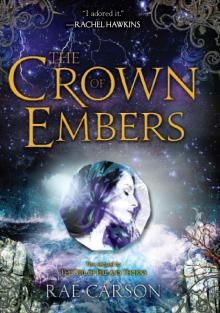 The Crown of Embers
The Crown of Embers The Girl of Fire and Thorns
The Girl of Fire and Thorns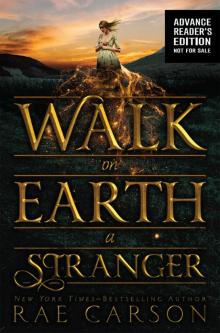 Walk on Earth a Stranger
Walk on Earth a Stranger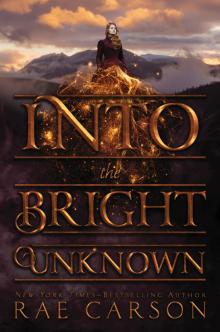 Into the Bright Unknown
Into the Bright Unknown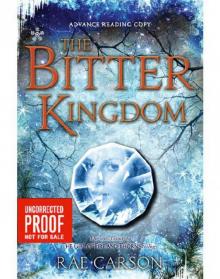 The Bitter Kingdom
The Bitter Kingdom The Rise of Skywalker
The Rise of Skywalker Like a River Glorious
Like a River Glorious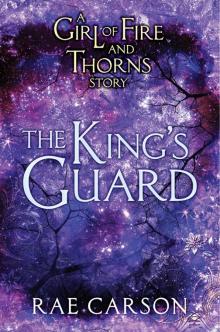 The King's Guard
The King's Guard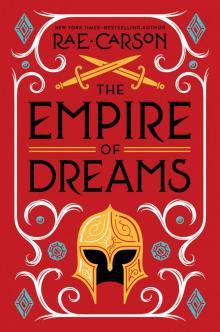 The Empire of Dreams
The Empire of Dreams Most Wanted
Most Wanted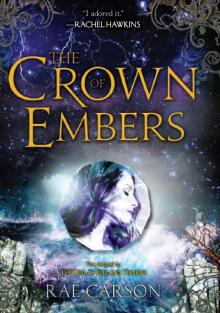 The Crown of Embers fat-2
The Crown of Embers fat-2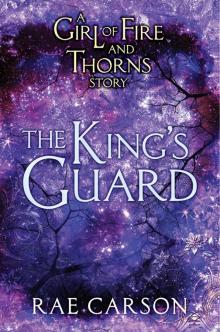 The King's Guard (fire and thorns)
The King's Guard (fire and thorns)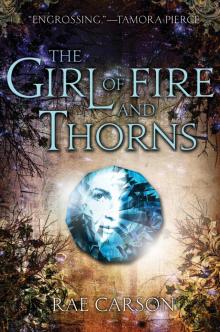 The Girl of Fire and Thorns fat-1
The Girl of Fire and Thorns fat-1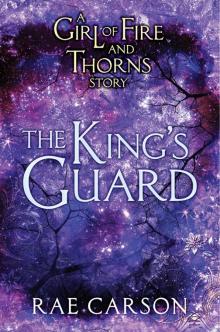 Fire and Thorns 00.7: King's Guard
Fire and Thorns 00.7: King's Guard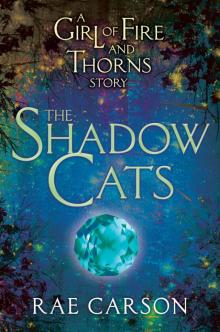 The Shadow Cats (fire and thorns )
The Shadow Cats (fire and thorns )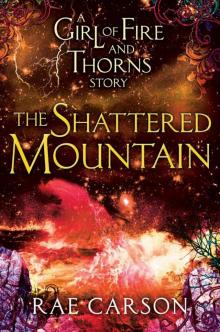 The Shattered Mountain (fire and thorns)
The Shattered Mountain (fire and thorns)